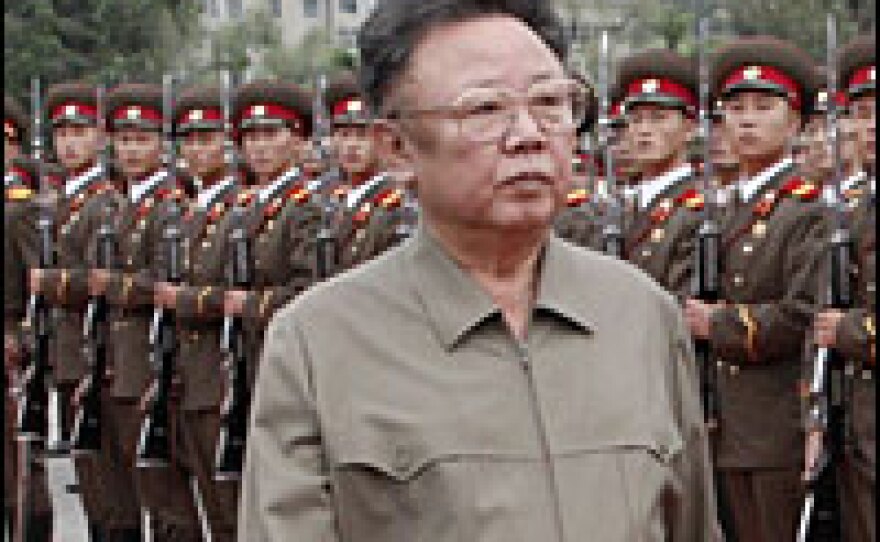The speculation over whether Kim Jong Il is incapacitated is just another example of the secrecy that surrounds the North Korean leader.
North Korea watchers have had to judge Kim's status largely by rumors and by his absence from key events, rather than from any North Korean government information.
Seen by many in the West as an eccentric, comic figure seeking to stand taller with his pompadour of black hair and platform shoes, Kim Jong Il has surprised observers by grasping power as firmly as his father, known as "The Great Leader."
A Mythic Biography
Secrecy and propaganda have characterized many aspects of Kim's biography. Even his birth information is disputed. Soviet records show that Kim Jong Il was born in Siberia in February 1941, when his father, Kim Il Sung, commanded a battalion of Korean and Chinese exiles in the Soviet Army.
Kim Jong Il's official biography puts his birth a year later, at a guerrilla camp on Korea's highest mountain. The biography also says Kim's birth was heralded by various portents of future greatness, including the appearance of a double rainbow and a new star in the sky.
The official biography says Kim received his early education in schools in Pyongyang, but some authorities say it's more likely that he was educated in China, as a way of keeping him safe during the Korean War.
Rising Through Party Ranks
While his father built a powerful cult of personality, the younger Kim held a variety of posts in the ruling Korean Workers Party, often as an enforcer of his father's ideology. He helped consolidate the party's control over the North Korean military and oversaw the production of propaganda materials, especially movies.
By 1982, Kim Jong Il held the top positions in the party and the military commission, and foreign observers began regarding him as the likely heir apparent to North Korea's leadership. At the same time though, he had acquired a reputation in the West as a womanizer, a heavy drinker and a fan of Hollywood action movies.
An Uncertain Succession
When Kim Il Sung died in 1994, it wasn't clear whether Kim Jong Il would be strong enough to match his father's God-like status or to fend off rivals for control of the government. Kim Il Sung's cult of personality was so pervasive that even in death he was named "eternal president," and the post of active president was abolished.
It wasn't until 1998 that it became fully clear to outsiders that Kim Jong Il was in command. That year, his post as chairman of the National Defense Commission was declared to be the highest position in the North Korean government.
Peter Maass, a reporter for The New York Times Magazine, told NPR in 2006 that Kim was underrated as a political leader when he first came to power. Maass, who has written extensively about Kim, said information that has emerged lately shows Kim was learning about his future role throughout his early years.
Maass says it's a portrait "of somebody, who even from a young age, as a teenager, was very smart, was interested in politics, was taking notes, was traveling with his father to Russia, and really kind of learning about power, how to manipulate power, how to stay in power."
As it did when Kim Jong Il's father died, speculation now centers on who is likely to succeed him. Kim Jong Il has three sons. The eldest, Kim Jong Nam, 37, is thought to have backing form China, but his 27-year-old half brother, Kim Jong Cheol, appears to have support from high ranking North Korean government officials.
Copyright 2022 NPR. To see more, visit https://www.npr.org. 9(MDAzMjM2NDYzMDEyMzc1Njk5NjAxNzY3OQ001))






